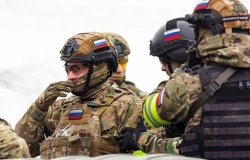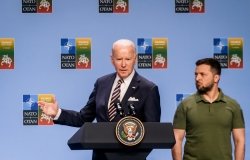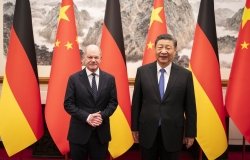Camp David 25th Anniversary Retrospective
September 17 marks the 25th anniversary of the signing of the Camp David Accords. To mark this historic event, The Carter Center hosted the 1978 Egyptian, Israeli, and American delegations for a discussion of the Accords and the negotiations that led to it. A video of this event will soon be available on this site.
Twenty-five years ago, U.S. President Jimmy Carter gathered two bitter foes, Israeli Prime Minister Menachem Begin and Egyptian President Anwar Sadat, at the White House retreat in the Catoctin Mountains of Maryland. President Carter asked the two leaders to meet face-to-face, secluded from the outside world, to try to resolve issues at the root of their countries' long-standing conflict.
What resulted from 13 days of long, intense negotiations was "A Framework for Peace in the Middle East," known as the Camp David accords. This laid the groundwork for the Peace Treaty between Egypt and Israel, signed in March 1979, and for potential future peace treaties between Israel and the other parties to the conflict.
Now, on Sept. 17, 25 years after the Camp David accords were signed, President Carter will gather the delegations from each of the three participant nations--Israel, Egypt, and the United States--in Washington, D.C. to discuss lessons learned and how they can be applied to the Israeli-Palestinian conflict today.
"We must recognize peacemaking is a long and difficult process," President Carter said. "It doesn't yield to quick fixes or sudden bursts of enthusiasm."
During the symposium, President Carter will lead a discussion on how lessons learned from 1978 might be applied to the current Middle East road map. Participants will discuss their respective strategies and negotiating styles during the 13-day negotiations, and reconsider achievements and missed opportunities.
Agenda
This event is by invitation only. The live webcast will cover the entire day.
9:00 a.m. Opening Session
Welcoming Remarks by Lee H. Hamilton, President and Director of the Woodrow Wilson Center
Retrospective Perspectives---Discussion moderated by Jimmy Carter
- Egyptian delegation: Egyptian Presidential Foreign Policy Advisor Osama el-Baz (via video conference)
- Israeli delegation: Israel Attorney General Elyakim Rubinstein and Israeli Supreme Court President Aharon Barak
- U.S. delegation: former Vice President Walter Mondale, former National Security Advisor Zbigniew Brzezinski, former National Security Council Staff for Mideast Affairs William Quandt, former Assistant Secretary of State for Near Eastern and South Asian Affairs Harold Saunders, former U.S. Ambassador to Egypt Hermann Eilts, former U.S. Ambassador to Israel Samuel Lewis, former White House Chief of Staff Hamilton Jordan, and former White House Press Secretary Jody Powell
Topics for Discussion:
What approaches worked?
What were the strategies and tactics of the sides?
How did the sides view each other and adjust to one another?
10:30 a.m. Break
10:45 a.m. Discussion Resumes
11:30 a.m. Questions entertained from 1978 Press representatives
12:10 p.m. Morning Session Concludes
12:30 p.m. Lunch
1:15 p.m. Remarks by President Carter
1:45 p.m. Lunch ends
2:00 p.m. The Way Forward: Commentary on the Road Map for Peace and Applications of Lessons Learned from Camp David
Discussion among participants
3:15 p.m. Break
3:30 p.m. Open Forum discussion between U.S. participants and invited guests
4:15 p.m. Closing comments from Participants
4:30 p.m. Press Conference
5:15 p.m. Press Conference Concludes










